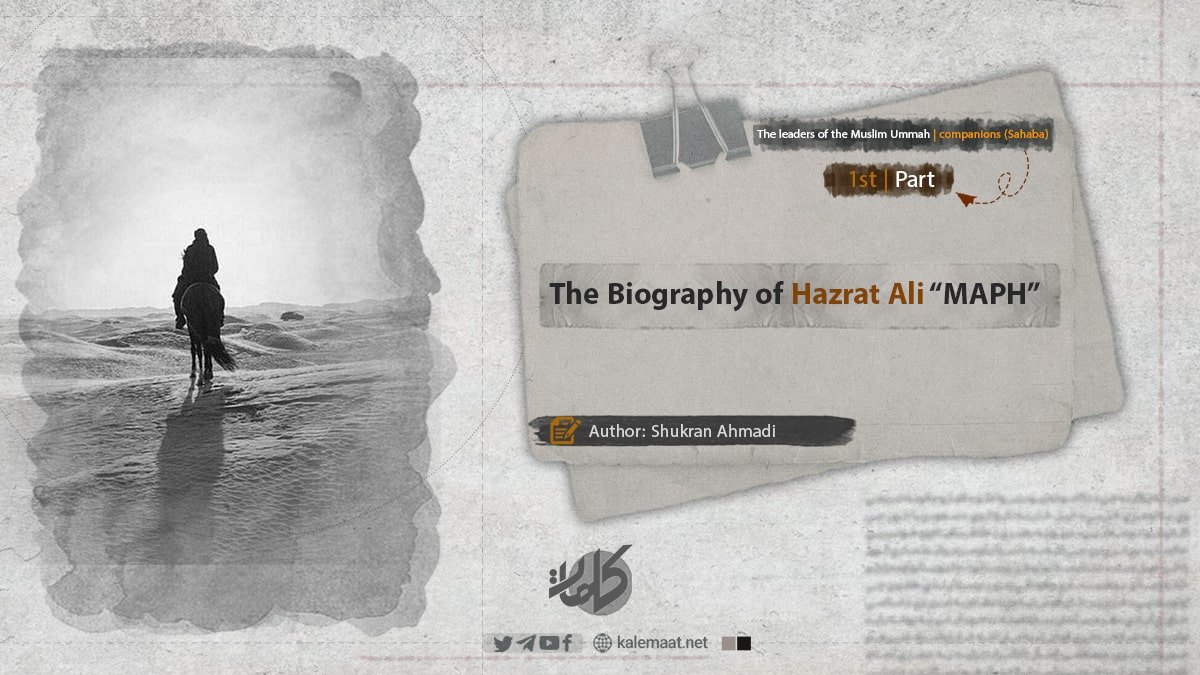Author: Shukran Ahamdi
The biography of Hazrat Ali “MAPH (1st part)”
Foreword
الحمد لله والصلاة والسلام على رسول الله، وعلى آله وصحبه ومن والاه.
After the great blessing of the Prophet of Islam, peace and blessings of Allah be upon him, and the completion of the religion and the end of Prophethood, the greatest blessing that the Islamic Ummah benefited from was the blessing of establishing and empowering religion in the form of the “Rashidun Caliphate” which occurred over a long historical period.
Although this period was apparently short, in terms of its importance and influence for the survival and perpetuity of the Islamic religion and the Islamic Ummah, and for the fate of the world after the end of Prophethood, it played a vital and history-making role as a model for the following periods.
In this glorious era, due to the faith and actions inspired by the blessed teachings of the School of Prophethood, the blessings of Muhammad’s mission spread globally, and the foundations of the religion were firmly established. The Qur’an, as the primary and eternal source of the Islamic religion, was safeguarded from distortion and dispersion and was compiled in Mushafs, published worldwide.
The Sunnah and Hadith, as the second most valuable sources of the religion, flourished in the scientific and educational circles of the Islamic world, becoming the basis of jurisprudence and ijtihad legislation. The science of jurisprudence found its path, and the pioneering principle of consensus and analogy was established to provide guidance for the Islamic Ummah in controversial matters. Additionally, disciplines such as ethics, wisdom, morals, family studies, and societal management flourished during this period, finding proper and deserving expression.
Since the Prophet, peace and blessings be upon him, is the final and most perfect Prophet of Allah and his teachings are also flawless in every aspect, his governance serves as the epitome of governance until the Day of Judgment. Therefore, it was essential to establish his successors after him.
The individuals who succeeded him were all among the best-educated disciples of the School of the Holy Prophet, i.e., the noble Companions. They were most deserving to emulate the Prophet’s governance. For this reason, their rule was termed the Rashidun Caliphate. However, as time passed after the Rashidun Caliphate, the nature of subsequent governments became more varied compared to the past.
While the caliphs of the Rashidun era, following the radiant example set by the Prophet, tirelessly endeavored to adhere to his sublime path, always striving to uphold and follow the Sharia and Sunnah to the best of their abilities. Each of them took steps and made sacrifices according to the demands of their time.
During the Caliphate, they chose an ascetic lifestyle, refraining from using the treasury funds for personal luxuries and even selling their personal property to return the proceeds to the state treasury. Their selfless acts of sacrifice and asceticism set a high standard, aligning closely with the values upheld by the Prophet and his successors.
The ascetic way of life demonstrated by Hazrat Ali, may Allah be pleased with him, illuminated the essence of the Prophetic caliphate, following the footsteps of Abu Bakr and Umar. Great ascetics and pious figures could not match his simple and humble way of living.
Faith in the unseen and belief in the Hereafter, instilled by the Prophet and his honorable companions, shaped their minds, hearts, character, morals, actions, and politics. Their unwavering faith was evident in times of ease and hardship, victory and defeat, poverty and rulership. The righteous caliphs exemplified this faith, faithfully following the Prophet’s teachings.
Each of the righteous caliphs, in their turn, held steadfast to the truth, showcasing that Prophethood denotes Divine governance and governance embodies Prophethood. Their collective rule during this short period (not exceeding 30 years) sets a benchmark for all future periods and stages of Islamic life, offering guidance for navigating inevitable challenges.
The good governance of Abu Bakr serves as a blueprint for initiating work and advancing through various stages, emphasizing perseverance, faith, and conviction. The era of Umar’s caliphate showcases how faith should be channeled during times of peace and growth, highlighting the virtues of patience, steadfastness, courage, and resilience. Lessons in balancing faith and governance can be drawn from the lives of Ali and Uthman.
For a nation destined to endure until the end of time, experiencing the full spectrum of historical fluctuations, it was imperative to have these diverse examples. The caliphate, with all its facets, provided these examples, completing this guide. May Allah be pleased with Abu Bakr, Umar, Uthman, and Ali, granting them enduring rewards.
One of the significant and contemplative events during the Caliphate era, occurring in the reign of Hazrat Ali, may Allah be pleased with him, was the Battle of Siffin and the subsequent Arbitration. Many writers and historians have been puzzled by the conflicting accounts of this incident, painting an unfortunate picture of the noble companions, especially Hazrat Ali, Hazrat Abu Musa Ashari, and Hazrat Amr bin Al. Accounts criticizing the judgment of Hazrat Abu Musa Ashari and accusing Hazrat Amr bin Al of deceit are likely inaccurate, propagated by opponents and detractors. Careful evaluation and scholarly scrutiny of such accounts are necessary to understand the true narrative.
I tried my best; I have endeavored to elucidate the events surrounding the Battle of Siffin and the subsequent arbitration based on authentic traditions endorsed by reputable scholars of Islamic history and Sunni scholars. The treatise briefly explores the life of Hazrat Ali, the Battle of Siffin, the wisdom behind the arbitration, and the Sunnah regarding companions’ disputes, concluding with reflections. May Allah accept this humble effort and provide guidance.
In conclusion, I extend my gratitude to esteemed professors and colleagues for their assistance, support, and encouragement throughout the research and compilation of this treatise. May Allah be pleased with them.



